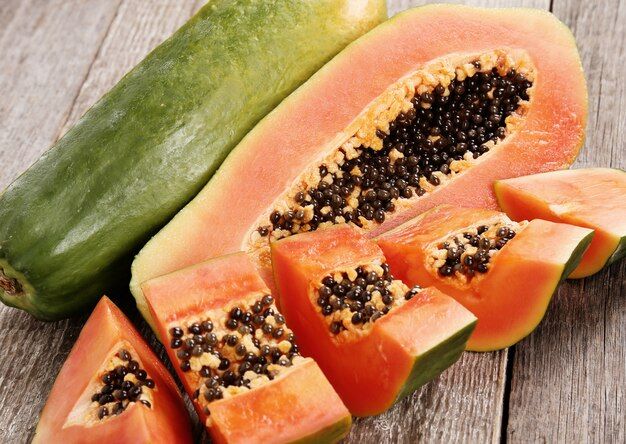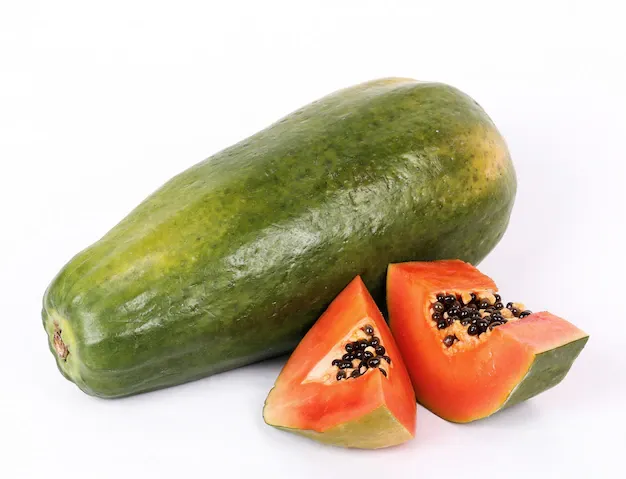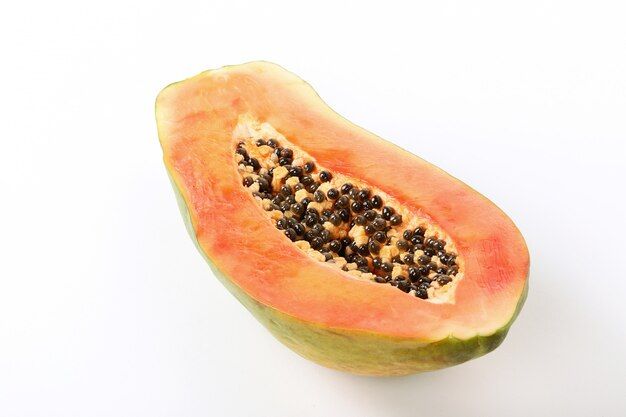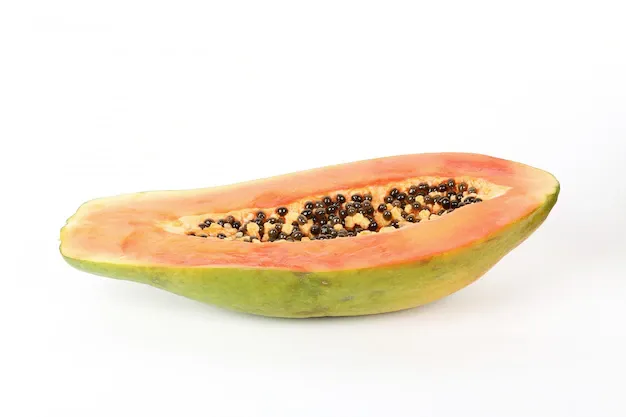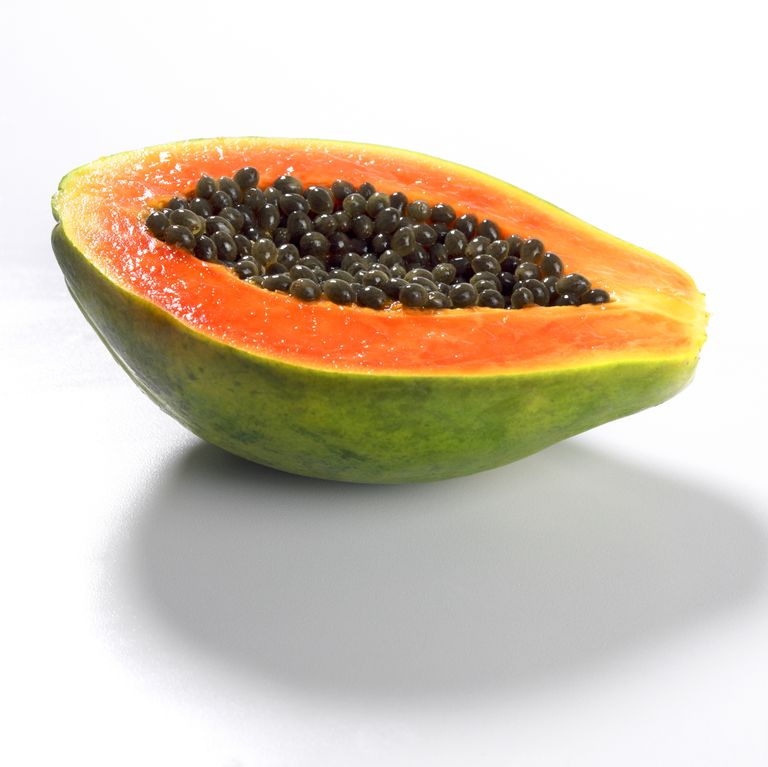Hello Everyone..
How are you all hope all are you well.
Today I am back again with my another's blog.
Papaya Gardening Method
Papaya (Carica papaya) is a tropical fruit that is loved for its sweet flavor, high nutritional value, and versatility in various cuisines. It is relatively easy to grow and can thrive in warm, tropical climates. However, growing papaya requires understanding its needs and providing the right conditions. Below are key steps to growing papaya successfully.
A. Selecting a Site
Papayas require full sunlight to grow well, so choose a location that receives at least 8 to 10 hours of direct sunlight daily. It’s important to ensure that the site is well-drained since papayas do not thrive in waterlogged soils. They also need protection from strong winds, as their long, slender trunks can be easily damaged.
B. Soil Preparation
Papayas grow best in well-draining, sandy, loamy soils. The soil should be slightly acidic to neutral with a pH between 5.5 and 7.0. Before planting, amend the soil by mixing organic compost or well-rotted manure to improve fertility. A raised bed can also improve drainage if the soil is heavy.
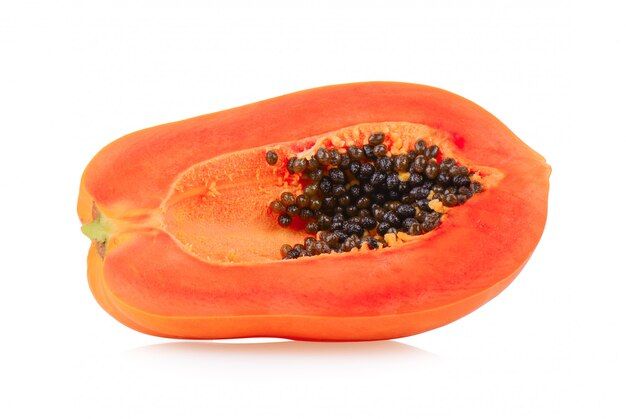
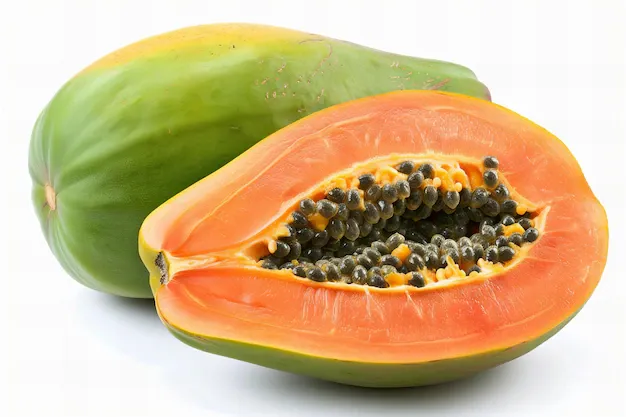
C. Propagation and Planting
Papayas are typically grown from seeds, although they can also be propagated through cuttings in some cases. To grow papayas from seeds, extract the seeds from a ripe papaya and clean them thoroughly. Dry the seeds for a couple of days before planting.
Plant seeds about 1 inch (2.5 cm) deep into the soil, spacing them around 5 feet (1.5 meters) apart if planting multiple papaya trees. The seeds should germinate in 2 to 3 weeks. In tropical regions, planting is done year-round, but it’s best to avoid planting during the rainy season in areas that receive heavy rainfall.
D. Watering
Papayas need regular watering to maintain consistent moisture levels in the soil. Water the plants thoroughly but avoid waterlogging the soil, as this can lead to root rot. During dry periods, papayas may need more frequent watering, but the soil should always drain well.
E. Fertilization
Papayas are heavy feeders and require consistent feeding to produce healthy fruit. Apply a balanced fertilizer with a high amount of nitrogen, as this encourages lush foliage growth. Organic fertilizers like compost and fish emulsion work well for papayas. Fertilize the plants every 4 to 6 weeks to support their rapid growth.
F. Pruning and Maintenance
Papayas have an open, branched structure, which allows them to grow without much interference. However, pruning can help improve air circulation, reduce the risk of disease, and encourage stronger growth. Prune any dead or damaged leaves and remove any side shoots that may interfere with the plant's main trunk.
In addition to pruning, check your papaya plants regularly for pests such as aphids, whiteflies, and spider mites. Insecticidal soap or neem oil can help control these pests organically.
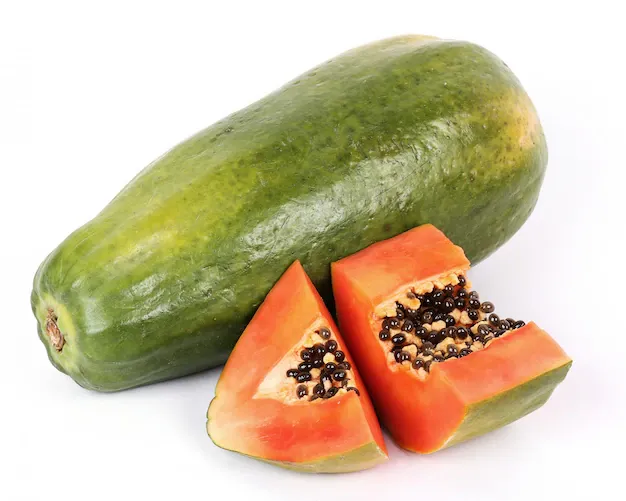
G. Harvesting Papayas
Papayas can be harvested once they begin to turn yellow or orange and feel slightly soft when pressed. The fruit is usually ready to harvest about 6 to 12 months after planting, depending on the variety. It's important to pick papayas carefully to avoid bruising the delicate skin.
Papayas do not ripen fully on the tree, so you can also pick them when they are still partially green and let them ripen at room temperature. The ripe fruit can be stored in the refrigerator to extend its shelf life for a few days.
Benefits of Eating Papaya
Papaya is a nutrient-dense tropical fruit that offers numerous health benefits. Some of the key benefits include:
A. Rich in Nutrients: Papayas are an excellent source of vitamin C, providing more than 200% of the recommended daily intake in just one serving. They are also rich in vitamins A, E, and folate, as well as dietary fiber and antioxidants.
B. Supports Digestion: Papayas contain an enzyme called papain, which helps break down proteins and aids in digestion. This makes papaya a great food for those with digestive issues such as indigestion, bloating, or constipation.
C. Boosts Immune System: The high vitamin C content in papayas helps strengthen the immune system by supporting the production of white blood cells that fight infections. The antioxidants in papayas, such as beta-carotene, also protect the body from harmful free radicals.
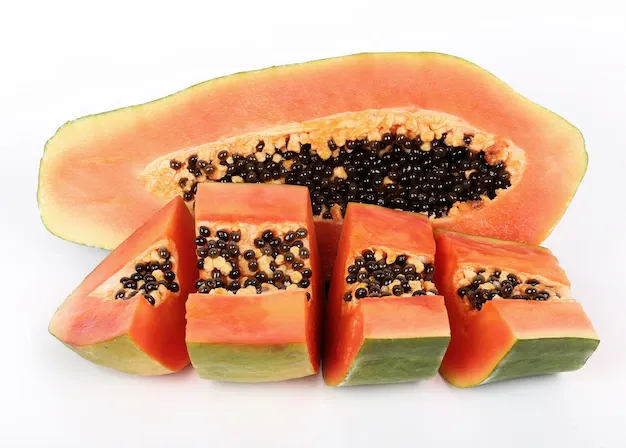
D. Promotes Skin Health: Papayas are rich in antioxidants, including vitamin C and beta-carotene, which help protect the skin from damage caused by UV rays, pollution, and aging. The enzymes in papaya also have exfoliating properties, which can be beneficial for the skin when used in topical treatments.
F. Supports Heart Health: The antioxidants and fiber in papayas contribute to heart health by reducing inflammation and lowering cholesterol levels. The fiber in papayas can also help maintain healthy blood pressure and improve overall cardiovascular health.
G. Aids Weight Loss: Papayas are low in calories and high in fiber, making them a great choice for those trying to lose weight or maintain a healthy weight. The fiber content helps promote satiety and prevents overeating.
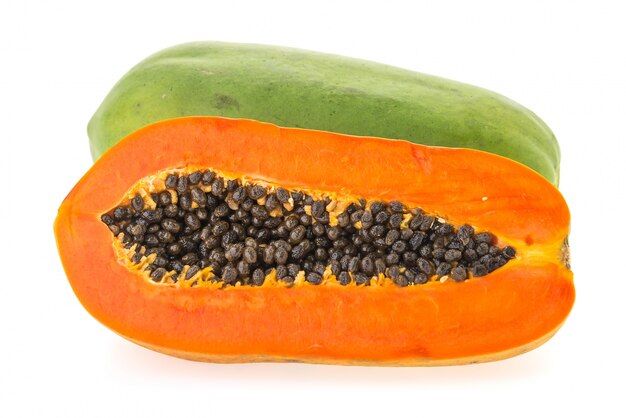
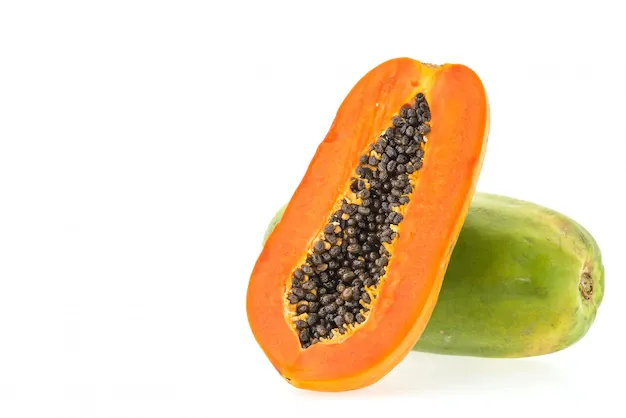
H. Anti-Inflammatory Properties: The papain enzyme and other compounds in papayas have natural anti-inflammatory effects, which can help reduce inflammation in the body and alleviate conditions such as arthritis or other inflammatory disorders.
The Benefits of Papaya Vitamins
Papayas are loaded with a wide array of vitamins and nutrients, making them an excellent addition to a balanced diet. The following section delves into the specific vitamins found in papayas and their respective health benefits.
Vitamin C: The Immune Booster
One of the standout nutrients in papayas is vitamin C, an essential antioxidant that supports immune function and protects the body from oxidative stress. A single papaya contains over 200% of the recommended daily intake of vitamin C, making it one of the best natural sources of this vitamin.
Boosting Immunity: Vitamin C is essential for the production of white blood cells, which play a crucial role in defending the body against infections and illnesses. By consuming enough vitamin C, papaya helps support the immune system's ability to fight off pathogens and reduce the severity of illnesses like the common cold.
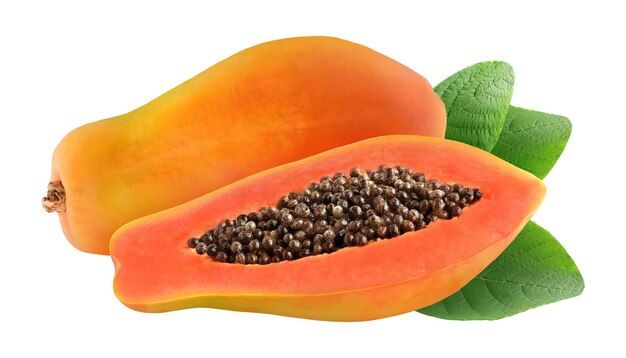
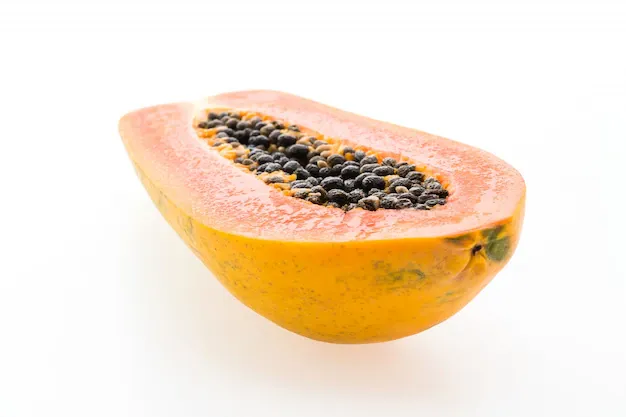

Photo credit
Collagen Formation: Vitamin C is vital for the synthesis of collagen, a protein that helps maintain healthy skin, blood vessels, and connective tissues. This makes papaya an excellent choice for promoting skin elasticity and reducing the appearance of wrinkles.
Antioxidant Protection: As a potent antioxidant, vitamin C neutralizes free radicals in the body, which can otherwise cause cellular damage and contribute to aging and chronic diseases. Regular consumption of papaya can help reduce oxidative stress and protect the body from various health issues.
Vitamin A: Vision and Skin Health
Papayas are rich in provitamin A, particularly in the form of beta-carotene, which the body converts into active vitamin A. This vitamin is crucial for various bodily functions, including vision, immune function, and skin health.
Promoting Eye Health: Vitamin A plays a key role in maintaining healthy vision, particularly in low-light conditions. A deficiency in vitamin A can lead to night blindness, dry eyes, and other vision problems. Regular consumption of papaya can help prevent such issues and support overall eye health.
Supporting Skin Health: Vitamin A is essential for maintaining healthy skin by promoting cell turnover and regeneration. It also helps prevent dryness, acne, and other skin conditions. Vitamin A contributes to a youthful appearance by protecting the skin from sun damage and reducing the risk of wrinkles.
Vitamin E: The Skin Protector
Vitamin E is another important antioxidant found in papayas, known for its ability to protect the skin from oxidative damage and promote overall skin health.
Protecting Against UV Damage: Vitamin E acts as a natural sunscreen, protecting the skin from the harmful effects of UV radiation. It helps prevent sunburn, photoaging, and even skin cancer by neutralizing free radicals generated by UV exposure.
Moisturizing the Skin: Vitamin E has hydrating properties that help retain moisture in the skin, making it appear soft and smooth. It is commonly used in skincare products for its ability to combat dry skin and promote a healthy complexion.
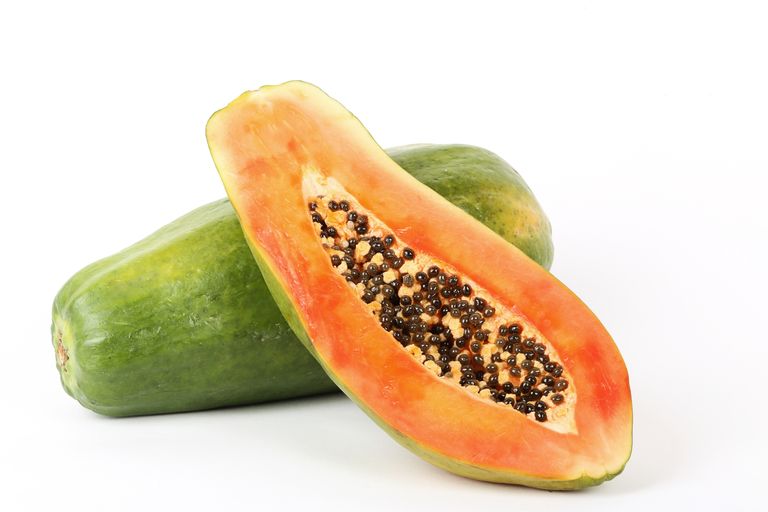
Folate: Essential for Cell Growth
Papayas are also a good source of folate (vitamin B9), an essential nutrient that plays a critical role in cell division, DNA synthesis, and overall growth and development.
Supporting Pregnancy: Folate is particularly important for pregnant women, as it helps prevent birth defects related to the brain and spine, such as neural tube defects. Consuming papaya regularly can help meet the increased folate needs during pregnancy.
Supporting Heart Health: Folate helps lower homocysteine levels, an amino acid that, at elevated levels, can increase the risk of cardiovascular diseases. By incorporating folate-rich foods like papaya into the diet, individuals can support healthy blood circulation and reduce the risk of heart-related issues.
Other Vitamins and Nutrients in Papaya
In addition to the key vitamins mentioned above, papayas also contain small amounts of other important vitamins and minerals, including:
Vitamin K: This vitamin is essential for blood clotting and bone health.
Vitamin B6: Important for brain function and the production of red blood cells.
Magnesium: Supports muscle function, nerve function, and bone health.
Potassium: Essential for maintaining healthy blood pressure and proper heart function.

Conclusion: A Nutrient Powerhouse
In conclusion, papayas are an incredibly nutritious fruit that provides a wide range of vitamins and minerals beneficial for overall health. The rich content of vitamin C, vitamin A, and folate makes papaya a powerful food for boosting immunity, promoting healthy skin, supporting eye health, and aiding digestion. Incorporating papayas into the diet can provide various health benefits and improve overall well-being. Whether eaten fresh, in smoothies, or as part of a meal, papayas are a delicious and nutritious addition to any diet.
So far Today...
Stay Home
Thanks for Your Time Friend.
♥♥♥♥♥♥
Ok
See you Again in a New blog.
Thanks for being with me.
Plese Follow Me......
@mspbro
★★To contact me★★
Subscribe My 3speak Channel https://3speak.online/user/mspbro
Follow me Twitter https://twitter.com/mdsumonpra
Add me Facebook https://www.facebook.com/sumon.mim84
